| Listing 1 - 10 of 56 | << page >> |
Sort by
|
Book
ISBN: 9060044010 9789060044018 Year: 1989 Volume: 45 Publisher: Nieuwkoop De Graaf
Abstract | Keywords | Export | Availability | Bookmark
 Loading...
Loading...Choose an application
- Reference Manager
- EndNote
- RefWorks (Direct export to RefWorks)
History of civilization --- Christian church history --- Erasmus, Desiderius --- Erasmus, Desiderius, --- Adversaries --- 873.4 ERASMUS ROTERODAMUS, DESIDERIUS --- 873.4 ERASMUS ROTERODAMUS, DESIDERIUS Humanistisch Latijnse literatuur--ERASMUS ROTERODAMUS, DESIDERIUS --- Humanistisch Latijnse literatuur--ERASMUS ROTERODAMUS, DESIDERIUS --- Érasme --- Desiderius Erasmus --- Erasm, Dezideriĭ --- Erasme, Désiré --- Erasmo, --- Erasmo, Desidério --- Erasmus, --- Ėrazm, --- Erazm, --- Roterodamus, Erasmus --- Rotterdamskiĭ, Ėrazm --- Rotterdamský, Erasmus Desiderius --- Роттердамский, Эразм --- Эразм, --- Ерасм, Дезидерий --- Adversaries. --- church history --- humanism --- Erasmus Roterodamus, Desiderius --- Erasmus --- Criticism and interpretation --- 16th century --- Bible --- Criticism [Textual ] --- Controversial literature --- エラスムス, デシデリウス --- Erasmus, Desiderius, - -1536 - Adversaries --- Erasmus, Desiderius, - -1536 --- Desiderius Erasmus, --- Erasm, Dezideriĭ, --- Erasme, Désiré, --- Erasmo, Desidério, --- Roterodamus, Erasmus, --- Rotterdamskiĭ, Ėrazm, --- Rotterdamský, Erasmus Desiderius, --- Роттердамский, Эразм, --- Ерасм, Дезидерий, --- אראסמוס, דסידריוס, --- Erasme, didier (1469-1536) --- Relations --- Catholicisme --- Critique et interpretation
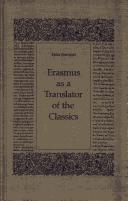
ISBN: 0802056539 1442615141 9786612039515 1282039512 1442674547 9781442674547 9780802056535 9781442615144 Year: 1985 Volume: 7 Publisher: Toronto University of Toronto Press
Abstract | Keywords | Export | Availability | Bookmark
 Loading...
Loading...Choose an application
- Reference Manager
- EndNote
- RefWorks (Direct export to RefWorks)
This first full-length study of Erasmus’ translations of classical literature examines his approach to translation and, more generally, his role as a transmitter of the classics. It traces in chronological order the progress of his Greek studies and the publication history of his translations from Greek into Latin; these included selections from the works of Libanius, Euripides, Plutarch, Lucian, Galen, Isocrates and Xenophon. It also illustrates Erasmus’ methods with appropriate examples from his own texts and from those of his predecessors and contemporaries. In so doing it provides an overview of the state of Greek literature in the Renaissance.Erasmus shifted from literal translation to a more liberal approach – a change in attitude that was accompanied by a redefinition of his role as translator. In his early work he had pursued private goals, regarding his versions from secular authors as private pieces for his magnum opus, the New Testament. In later years his approach became more reader-oriented. He saw his work in terms of a service to scholarship – making Greek literature accessible to Latin readers and acting as their guide to classical thought. He was concerned not only with the mechanics of conveying the factual contents and literary qualities of the original, but also with the applicability of its moral content to Christian philosophy.This book includes a chapter on Erasmus’ New Testament version; by allowing a fuller evaluation of Erasmus’ contribution to philology, this subject adds an important dimension to the book. Erasmus’ translations of Greek texts reflect two concerns that dominated his life. As an educator he wanted to see classical philology firmly established in the curriculum of schools; as a Christian humanist he wanted to convince biblical scholars that it was an indispensable tool of their profession.
Theory of literary translation --- Classical Greek language --- Classical Latin language --- Erasmus, Desiderius --- Translating and interpreting --- Greek literature --- Classical literature --- Greek language --- Classical languages --- Humanists --- Dead languages --- Languages, Classical --- Literature, Classical --- Interpretation and translation --- Interpreting and translating --- Language and languages --- Literature --- Translation and interpretation --- History --- Translations into Latin --- History and criticism. --- Translations --- Translating into Latin --- History. --- Translating into Latin. --- Translating. --- Translating --- Erasmus, Desiderius, --- Érasme --- Desiderius Erasmus --- Erasm, Dezideriĭ --- Erasme, Désiré --- Erasmo, --- Erasmo, Desidério --- Erasmus, --- Ėrazm, --- Erazm, --- Roterodamus, Erasmus --- Rotterdamskiĭ, Ėrazm --- Rotterdamský, Erasmus Desiderius --- Роттердамский, Эразм --- Эразм, --- Ерасм, Дезидерий --- Netherlands --- Intellectual life --- Scholars --- Indo-European languages --- Classical philology --- Greek philology --- Literature, Ancient --- Latin literature --- Balkan literature --- Byzantine literature --- Translators --- Translations&delete& --- History and criticism --- Translating into Latin&delete& --- Translations into Latin&delete& --- Erasmus Roterodamus, Desiderius --- Erasmus --- HISTORY / Renaissance. --- エラスムス, デシデリウス --- Translating and interpreting - Netherlands - History - 16th century --- Greek literature - Translations into Latin - History and criticism --- Classical literature - Translations - History and criticism --- Greek language - Translating into Latin - History --- Classical languages - Translating --- Humanists - Netherlands --- Erasmus, Desiderius, - -1536 --- Netherlands - Intellectual life - 16th century --- Desiderius Erasmus, --- Erasm, Dezideriĭ, --- Erasme, Désiré, --- Erasmo, Desidério, --- Roterodamus, Erasmus, --- Rotterdamskiĭ, Ėrazm, --- Rotterdamský, Erasmus Desiderius, --- Роттердамский, Эразм, --- Ерасм, Дезидерий, --- אראסמוס, דסידריוס, --- Erasme, didier (1469-1536) --- Litterature classique
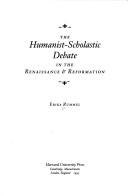
ISBN: 0674422503 Year: 1995 Volume: 120 Publisher: Cambridge, Mass. Harvard University Press
Abstract | Keywords | Export | Availability | Bookmark
 Loading...
Loading...Choose an application
- Reference Manager
- EndNote
- RefWorks (Direct export to RefWorks)
History of civilization --- History of philosophy --- anno 1500-1599 --- Argumentatie (Debatten en debatteren) --- Argumentation (Debates and debating) --- Argumentation (Débats et discussions) --- Debates and debating --- Debatten en debatteren --- Débats et controverses --- Débats et discussions --- Retorica --- Rhetoric --- Rhétorique --- Speading --- Humanism --- -Scholasticism --- -Rhetoric, Renaissance --- Renaissance rhetoric --- Theology, Scholastic --- Philosophy --- Philosophy, Medieval --- Classical education --- Classical philology --- Philosophical anthropology --- Renaissance --- Argumentation --- Speaking --- Elocution --- Forensics (Public speaking) --- Public speaking --- Discussion --- Oratory --- History --- Debates and debating. --- Rhetoric, Renaissance. --- Scholasticism --- History. --- Rhetoric, Renaissance --- Scholasticism - History.
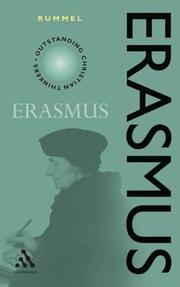
ISBN: 0826468144 0826468136 Year: 2004 Volume: *3 Publisher: London New York Continuum
Abstract | Keywords | Export | Availability | Bookmark
 Loading...
Loading...Choose an application
- Reference Manager
- EndNote
- RefWorks (Direct export to RefWorks)
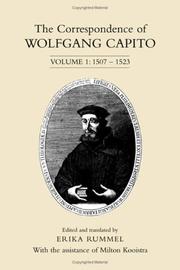
ISBN: 0802090176 0772706476 9786611991692 1442681063 1281991694 9781442681064 9780802090171 1487525885 Year: 2005 Publisher: Toronto
Abstract | Keywords | Export | Availability | Bookmark
 Loading...
Loading...Choose an application
- Reference Manager
- EndNote
- RefWorks (Direct export to RefWorks)
Wolfgang Capito (1478-1541) was one of the most important figures of the Reformation, a leading churchman who turned from Catholic to Protestant. A professor of theology and advisor to the Archbishop of Mainz, he moved to Strasbourg and worked for two decades toward the reformation of the city, which became, after Wittenberg, the most active centre of the Reformation movement. This volume - the first of three - is a fully annotated translation of Capito's existing correspondence, covering the years 1507-1523. The letters reveal his dialogue with leading humanists and reformers, such as Erasmus and Luther (with whom Capito had a contentious relationship), and reflect the cultural and political milieu of the time. They also offer significant insights into the progress of the Reformation. Erika Rummel's head- and footnotes provide historical context by identifying classical and biblical "ations as well as persons and places. The volume will aid historians of the Reformation by elucidating as yet imperfectly understood aspects of Capito's thought, such as his efforts to promote concord between the reformers, his stand in the Eucharistic controversy, the nature and limitations of his tolerance toward Anabaptists, and his views on the relationship between secular and church governments.
Theologians --- -Christian theologians --- Scholars --- Capito, Wolfgang, --- Capito, Wolfgang Faber, --- Capito, Wolfgang Fabricius, --- Capiton, Wolfgang, --- Capito, W. F. --- Cephalaeus, Vuolfius, --- Cephaleus, Wolfius, --- Cephalaeus, Wolfgangus, --- Köpfel, Wolfgang, --- Köpfel, W. --- Capito, Wolfang Fabricius --- Fabritius Capito --- Köpfel, Wolfgang --- Reformation. --- Humanists --- Protestant Reformation --- Reformation --- History --- Persons --- Learning and scholarship --- Church history --- Counter-Reformation --- Protestantism --- Capito, Wolfgang --- University of Toronto. --- History. --- Europe. --- Council of Europe countries --- Eastern Hemisphere --- Eurasia
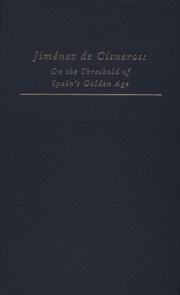
ISBN: 086698254X Year: 1999 Publisher: Tempe Arizona Center for Medieval and Renaissance Studies
Abstract | Keywords | Export | Availability | Bookmark
 Loading...
Loading...Choose an application
- Reference Manager
- EndNote
- RefWorks (Direct export to RefWorks)
929 JIMENEZ DE CISNEROS, FRANCISCO --- 27 <460> "14/15" --- 946.03 --- Statesmen --- -Cardinals --- -Public officers --- Biografie. Genealogie. Heraldiek--JIMENEZ DE CISNEROS, FRANCISCO --- Kerkgeschiedenis--Spanje--?"14/15" --- Geschiedenis van Spanje: éénmaking; Ferdinand V en Isabella--(1479-1516) --- Jimenez de Cisneros, Francisco --- Spain --- History --- -929 JIMENEZ DE CISNEROS, FRANCISCO --- -Biografie. Genealogie. Heraldiek--JIMENEZ DE CISNEROS, FRANCISCO --- 946.03 Geschiedenis van Spanje: éénmaking; Ferdinand V en Isabella--(1479-1516) --- 929 JIMENEZ DE CISNEROS, FRANCISCO Biografie. Genealogie. Heraldiek--JIMENEZ DE CISNEROS, FRANCISCO --- -946.03 Geschiedenis van Spanje: éénmaking; Ferdinand V en Isabella--(1479-1516) --- Espanja --- Spanien --- Hiszpania --- Spanish State --- España --- Estado Español --- Espagne --- Hispania --- Sefarad --- Sepharad --- Shpanye --- Shpanie --- Reino de España --- Kingdom of Spain --- Reino d'Espanya --- Reinu d'España --- Espainiako Erresuma --- Regne d'Espanya --- Reiaume d'Espanha --- Espanya --- Espanha --- スペイン --- Supein --- イスパニア --- Isupania --- Jiménez de Cisneros, Francisco, --- De Cisneros, Francisco Jiménez, --- Cisneros, Francisco de, --- Cisneros, --- Doctor Cisneros, --- Cisneros, Francisco Jiménez de, --- Ximénez de Cisneros, Francisco, --- Ximenes de Cisneros, Francisco, --- Cardenal Cisneros, --- Ximenes, --- Cardinal Ximenes, --- Cardinals --- Hommes d'etat --- Cardinaux --- Jimânez de cisneros (francisco), 1436?-1517 --- Biographies --- Histoire --- 1479-1516 (ferdinand et isabelle)
Book
ISSN: 18716377 ISBN: 9789004145733 9004145737 9786612396427 1282396420 9047442040 9789047442042 9781282396425 6612396423 Year: 2008 Volume: 9 Publisher: Leiden Brill
Abstract | Keywords | Export | Availability | Bookmark
 Loading...
Loading...Choose an application
- Reference Manager
- EndNote
- RefWorks (Direct export to RefWorks)
Throughout the Middle Ages dialectical disputation was the prevailing method of scholarly inquiry. In the fifteenth century, however, humanists challenged the scholastic method, proposing instead historical and philological approaches. This volume focuses on the polemic over the right approach to biblical studies. It describes manifestations of the controversy, ranging from its beginnings in quattrocento Italy to Germany, Spain, France, the Netherlands, and scholars associated with the papal court in the sixteenth century. Erasmus, the most prominent biblical humanist of his day, served as a lightning rod for many of the controversies discussed here and has also received much attention from modern scholars. The chapters offered here seek to lend a voice also to Erasmus’ critics and to right the balance in a historical narrative that has traditionally favoured the humanists. Contributors are John Monfasani, Daniel Menager, Carlos del Valle Rodríguez, Alejandro Coroleu, Charles Fantazzi, Guy Bedouelle, James Farge, Cecilia Asso, Marcel Gielis, Paolo Sartori, Paul F. Grendler, Nelson H. Minnich, Ronald K. Delph
Christianity and religious humanism.
---
Scholasticism.
---
Erasmus, Desiderius,
---
Bible
---
Criticism, interpretation, etc.
---
History
---
Christian religion
---
History of civilization
---
Philosophy
---
anno 1500-1599
---
Scholasticism
---
22.06 <09>
---
Theology, Scholastic
---
Philosophy, Medieval
---
Christianity and other religions
---
Humanism, Religious
---
-History
---
-Bijbel: exegese--
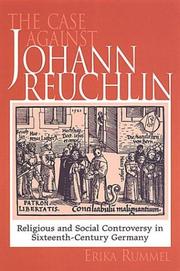
ISBN: 0802036511 0802084842 Year: 2002 Publisher: Toronto University of Toronto press
Abstract | Keywords | Export | Availability | Bookmark
 Loading...
Loading...Choose an application
- Reference Manager
- EndNote
- RefWorks (Direct export to RefWorks)
Christianity and other religions --- Humanism --- Jewish literature --- Judaism --- Scholasticism --- Judaism. --- History --- Censorship --- Germany --- Relations --- Christianity. --- Reuchlin, Johann, --- -Humanism --- -Jewish literature --- -Judaism --- -Scholasticism --- -Theology, Scholastic --- Philosophy --- Philosophy, Medieval --- Jews --- Religions --- Semites --- Judaica --- Hebrew literature --- Classical education --- Classical philology --- Philosophical anthropology --- Renaissance --- Christianity --- Syncretism (Christianity) --- -Germany --- -Censorship --- -History --- -Relations --- -Christianity --- -Religion --- Religion --- Literature --- Reuchlin, Johann --- Theology, Scholastic --- Relations&delete& --- Reuchlin, Joannes --- Reuchlin, Johannes --- Capnion --- Brotherhood Week --- Kapnion, Johannes, --- Capnio, Johannes, --- Reuchlinus, Johannes, --- Reuchlinus, Ioannes, --- Reuchlinus, Joannes, --- Reuchlin, Jean, --- Reuchlin, Johannes,
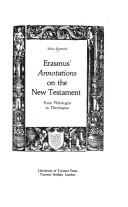
ISBN: 0802056830 Year: 1986 Volume: vol 8 Publisher: Toronto University of Toronto
Abstract | Keywords | Export | Availability | Bookmark
 Loading...
Loading...Choose an application
- Reference Manager
- EndNote
- RefWorks (Direct export to RefWorks)
225.014*4 --- 225.014*4 Nieuw Testament: geschiedenis van de moderne vertalingen --- Nieuw Testament: geschiedenis van de moderne vertalingen --- Erasmus, Desiderius --- Contributions in hermeneutics --- ERASME, DIDIER (1469-1536) --- BIBLE --- CRITIQUE, INTERPRETATION, ETC. --- HISTOIRE --- 1500 --- -ERASME, DIDIER (1469-1536) --- 1500-
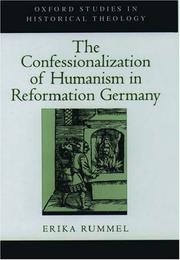
ISBN: 0195137124 Year: 2000 Publisher: Oxford Oxford University Press
Abstract | Keywords | Export | Availability | Bookmark
 Loading...
Loading...Choose an application
- Reference Manager
- EndNote
- RefWorks (Direct export to RefWorks)
Humanism --- Reformation --- 130.2:2 --- 930.85.46 --- 130.2:2 Filosofie van de religieuze cultuur. Christelijk humanisme --- Filosofie van de religieuze cultuur. Christelijk humanisme --- 930.85.46 Cultuurgeschiedenis: Humanisme --- Cultuurgeschiedenis: Humanisme --- Philosophy --- Classical education --- Classical philology --- Philosophical anthropology --- Renaissance --- Germany --- Church history --- Christian church history --- History of Germany and Austria --- anno 1500-1599
| Listing 1 - 10 of 56 | << page >> |
Sort by
|

 Search
Search Feedback
Feedback About UniCat
About UniCat  Help
Help News
News